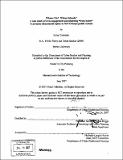Whose city? Whose schools? : a case study of civic engagement and planning "from below" to promote education equity in New Orleans public schools
Author(s)
Tahbildar, Dulari
DownloadFull printable version (5.218Mb)
Alternative title
Civic engagement and planning "from below" to promote education equity in New Orleans public schools
Other Contributors
Massachusetts Institute of Technology. Dept. of Urban Studies and Planning.
Advisor
Xavier de Souza Briggs.
Terms of use
Metadata
Show full item recordAbstract
How and why have ordinary citizens claimed their stake in the process of rebuilding public education in post-Katrina New Orleans, and what are the lessons for planning in post-disaster contexts? This paper investigates civic engagement that emerged "from below" in post-Katrina New Orleans through a case study of the Downtown Neighborhoods Improvement Association (DNIA) Education Committee. Civic engagement from below promotes the powerful idea that citizens can and should be agents of change within public decision-making, and not merely recipients of public services or providers of input in top-down approaches to reform. The case of the DNIA Education Committee reveals three key lessons relevant to civic engagement after a disaster. First, opportunities for collaboration between government and community groups can be easily missed, especially when dynamics of mistrust and unequal power are unaddressed, unless each party believes it is possible and knows how to invent options for collaboration that address their different needs while meeting their shared goals. Second, after a disaster residents may find their very survival intrinsically connected to, and indeed dependent on, how public institutions and infrastructure are rebuilt. (cont.) With a heightened sense of interconnectedness to their environment and awareness of government's role to protect the common good, individuals beyond the "usual suspects" may seek out ways to become engaged in civic life. Finally, when citizens discover that their values are not incorporated into the "official" recovery and rebuilding plan, a political will to create an alternative plan may emerge. However, there is a challenge to transforming this plan from a broad and values-based plan into an actionable plan. The thesis recommends several ways the DNIA Education Committee could enhance community capacity to shape a more equitable and effective system of public education in New Orleans: 1) translate the idea of "world-class, community-centered" education into a workable plan that policymakers and others can make decisions about and compare to their own plans, 2) build alliances with other organizations and actors in order to leverage vital resources and deepen impact, and 3) build capacity at the base to gain broader and more legitimate representation and promote social learning necessary to create an alternative plan.
Description
Thesis (M.C.P.)--Massachusetts Institute of Technology, Dept. of Urban Studies and Planning, 2007. Includes bibliographical references (p. 65-68).
Date issued
2007Department
Massachusetts Institute of Technology. Department of Urban Studies and PlanningPublisher
Massachusetts Institute of Technology
Keywords
Urban Studies and Planning.